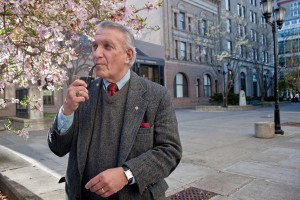Ithaca residents will now have to think twice before lighting a cigarette outdoors because of new smoking restrictions passed by the Ithaca Common Council last Wednesday.
The law, which will go into effect Aug. 1, will prohibit people from smoking near playgrounds, on walking trails and in certain areas of The Commons, according to Tompkins County Legislator Frank Proto.

Eric Rosario, Ithaca Common Council member, said the subcommittee came up with preliminary recommendations and a draft of the ordinance in 2008 and presented them in August 2009.
Rosario said the new nonsmoking area on The Commons covers most of the outdoor dining, the children’s playground and two pavilions. He said people will still be able to smoke at the three main entrances to The Commons.
Joel Zumoff, Ithaca Common Council member, voted for the legislation and said the law has penalties for people who do smoke in these restricted areas but expects police officers will give warnings before they ticket people. He said this is because the law was not proposed to raise money for the city but to create an environment where smoking is not an issue.
“The idea is that over time to have people understand that there are places where people congregate, where if you choose personally to engage in a self-destructive act, which cigarette smoking is, that’s your business,” Zumoff said. “But you don’t have the right to inflict your bad habit or the effects of your bad habit on the people who wish to avoid it.”
Ellen McCollister, Ithaca Common Council member, said the law will ban smoking in the T-zone, also known as the bank alley, on The Commons. People will be able to smoke on the perimeters of The Commons. McCollister is the only council member to vote against the legislation.
“It might have the effect of clustering smokers where there aren’t currently clusters, and that gives a very bad impression potentially at either end of The Commons,” she said.
She said she fully supports any legislation against indoor smoking or near areas where children play because secondhand smoke effects are evident. Then, she said, the council could see how the restrictions work and legislation could have evolved from there.
“This [legislation] started from the opposite end of things where it was a blanket reach,” she said.
McCollister said these restrictions are a government intrusion on the personal choices of people and enforcement will be difficult.
“It’s highly unlikely that people are going to be in the natural areas trying to catch the occasional smoker,” she said. “So, I just have a lot of pragmatic and philosophical concerns about it.”
Rosario said, according to his research, smoke- free environments are the most effective method for reducing exposures.
Rosario said people have the right to smoke but, as with any right, one should consider whether it is harmful to other people.
“If we were free to do whatever we wanted to do, pretty soon we wouldn’t be free at all, as other people’s actions could cause you harm — you wouldn’t leave the house,” he said.
Sophomore Melanie Connor, a smoker, said she does not think many people will respect the restrictions. She said it is a choice to smoke.
“It’s a public area,” she said. “I don’t see why people would have to abide by that. It’s not like we’re going inside buildings and smoking.”
Connor said most smokers are courteous when they smoke and there are solutions if the smoke is affecting someone.
“[Smokers are] not going to be blowing in anyone’s face, and at the same time people smoke everywhere so people can walk away or I can walk away if I see that it’s bothering someone,” she said.
Proto, a pipe smoker, said he does not approve of the restrictions on waterfront trails and did not vote.
“For heaven’s sake, if you’re walking on the walking trail around Cayuga Lake and you’re outside and the breeze is blowing and whatnot and there’s no one else around, to restrict smoking on the waterfront trail is a little bit ridiculous,” he said.
Proto said the law could have been avoided if there was more communication about making concerns known.
“Trying to put an action on the books that’s going to be very difficult to enforce is simply a waste of the public’s time and public’s money,” he said.
Rosario said the council has no evidence that says there will be more concentrations of smokers than there already are in the entrances of The Commons but that they will evaluate the progress over the next five years to see if the regulations are working.
“Will there be a bigger difference?” he said. “We have to see.”







